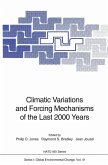Dieser Download kann aus rechtlichen Gründen nur mit Rechnungsadresse in A, B, BG, CY, CZ, D, DK, EW, E, FIN, F, GR, HR, H, IRL, I, LT, L, LR, M, NL, PL, P, R, S, SLO, SK ausgeliefert werden.
"This book is an impressive collaborative effort, with authors from a number of different countries ... . Each polar year has chapters that approximate a history, a description of expeditions and activities, and an evaluation of achievements. Well-known historians, scientists and polar commentators make up the impressive list of authors. ... they acknowledge and pay respect to the legendary early ... that have now become a part of the global polar heritage. ... Buy one for your bookcase or library ... ." (Julia Jabour, The Polar Journal, Vol. 1 (1), June, 2011)









